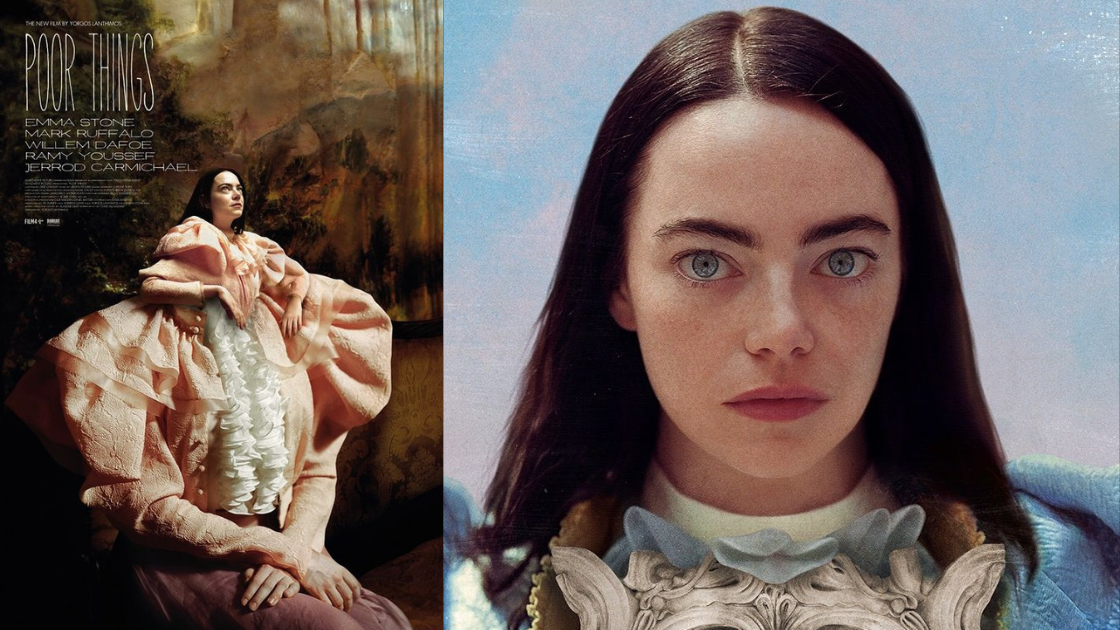
Poor Things Spoiler Review: A Riveting Tale of Self-Discovery and Liberation
A cinematic triumph, blending dark humor with profound themes of self-discovery and liberation. Emma Stone’s transformative performance as Bella Baxter is a masterclass in acting, while Yorgos Lanthimos’ visionary direction brings a unique, steampunk-infused Victorian era to life. This film is a must-watch, offering a thought-provoking exploration of identity and autonomy.
Dive deeper into the world of “Poor Things”, a cinematic tour de force that takes you on a journey of self-discovery and liberation. This spoiler review provides a comprehensive analysis of the plot, performances, and accolades of this groundbreaking film.
⭐⭐⭐⭐
Director: Yorgos Lanthimos
Screenplay: Tony McNamara
Based on Poor Things by Alasdair Gray
Cinematography: Robbie Ryan
Music: Jerskin Fendrix
Main Cast:
Emma Stone as Bella Baxter / Victoria Blessington
Mark Ruffalo as Duncan Wedderburn
Willem Dafoe as Dr. Godwin "God" Baxter
Ramy Youssef as Max McCandles
Christopher Abbott as Alfie Blessington
Kathryn Hunter as Madame Swiney
Jerrod Carmichael as Harry Astley
Hanna Schygulla as Martha Von Kurtzroc
Release Date: December 8, 2023 In Theaters (USA)
Runtime: 2 hours 21 minutes
Rating: R
Poor Things Synopsis
“Poor Things” is a 2023 film that has captivated audiences worldwide with its unique blend of steampunk aesthetics and Victorian-era charm. Directed by Yorgos Lanthimos and written by Tony McNamara, the film is based on the 1992 novel by Alasdair Gray. The plot centers around Bella Baxter, a young woman who, after being resurrected by a scientist following her suicide, embarks on an odyssey of self-discovery and sexual liberation.
Poor Things Plot Summary (Spoiler Ahead)
Bella Baxter, a woman who tragically ended her own life by leaping from a bridge, is resurrected by the scientist Godwin Baxter. Upon discovering her pregnancy during the resurrection process, Godwin replaces her brain with that of her unborn child. As Bella’s intelligence rapidly develops under Godwin’s watchful eye, she captures the heart of Godwin’s assistant, Max McCandles.
Yearning for adventure, Bella is swept away by Duncan Wedderburn, a lawyer who introduces her to the wonders of Lisbon. Here, Bella encounters new experiences, meets diverse individuals, and awakens a strong sexual desire.
As Bella’s intellect and autonomy grow, Duncan struggles to maintain control. During a cruise ship voyage, Bella meets Harry, a fellow passenger who exposes her to the harsh realities of the world. After Bella generously gives away Duncan’s money, they are expelled from the ship and find themselves in Paris. To survive, Bella turns to prostitution, forming a bond with Toinette, a fellow sex worker. Duncan spirals into despair upon learning of Bella’s new occupation.
Meanwhile, Godwin, unsuccessful in replicating his experiment with another woman named Felicity, falls seriously ill. He sends Max to retrieve Bella, who returns home and plans to marry Max. However, their plans are disrupted by General Alfie Blessington, Bella’s former husband from her previous life as Victoria. Alfie forces Bella to return with him, triggering the painful memory of why she chose suicide - her miserable marriage to him. When Alfie tries to confine her, Bella retaliates, causing him to accidentally shoot himself in the foot and knock himself out with his own chloroform concoction.
Following Godwin’s death, Bella continues his research with Max’s assistance, while Alfie’s brain is replaced with that of a goat.
Poor Things Ending Explained
The conclusion of "Poor Things" is a powerful testament to emancipation and personal agency. Bella Baxter, the protagonist, asserts her independence by escaping the control of Alfie Blessington, her former husband. This decision to shoot Alfie and return home symbolizes her rejection of male dominance. By swapping Alfie's brain with a goat's, Bella reverses traditional power dynamics.
In the end, Bella Baxter escapes Alfie’s clutches and returns to Godwin’s estate. She decides to become a doctor. Bella performs surgery on Alfie and swaps his brain with that of a goat. It is unclear whether Bella and Max will marry in the future, but as of now, the two remain friends.
This ending signifies Bella's journey from being a creation to becoming a full-fledged woman who learns the ways of the world through various experiences that change her and help her understand the complexities of her existence. Bella’s story wraps up with her escape from Alfie Blessington’s manor. After changing her mind about marrying Max, Bella goes with Victoria’s husband, but she’s quickly irked by his threats and attempts to control her every movement. Feeling trapped and wanting to leave, Bella ends up shooting Alfie in the foot and returning with him to her home. With Godwin now dead, Bella performs her first experiment, swapping Alfie’s brain with that of a goat. Bella ends up with her version of happily ever after.
Poor Things Star Cast Performance
Emma Stone's performance in "Poor Things" has been widely acclaimed. Her portrayal of Bella's journey from a childlike state to a sexually liberated woman is both compelling and nuanced. Her performance in "Poor Things" is considered the best of her career so far. Emma Stone's performance in "Poor Things" contributes significantly to the film's success, enhancing the narrative and adding a layer of intrigue to the story.
Mark Ruffalo's performance in "Poor Things" is noted for its comic relief. Ruffalo plays the role of Duncan Wedderburn, a debauched lawyer². His character is known for his outrageous behavior and fleshy naughtiness, which adds a layer of humor to the film. His ability to balance comedy with the narrative's darker elements contributes significantly to the film's overall appeal.
Willem Dafoe delivers a memorable performance in "Poor Things" as Dr. Godwin Baxter. His character is not as mad as one might think, adding a layer of complexity to the narrative. He brings a sense of authenticity to the role, capturing the eccentricities of his character while also highlighting his humanity.
The supporting cast of "Poor Things" also delivers stellar performances. Ramy Youssef, who plays Max McCandles, Godwin's assistant, gives a heartfelt performance. Christopher Abbott, who plays Alfie Blessington, Bella's abusive husband from her previous life, delivers a chilling performance. Jerrod Carmichael, who plays Harry Astley, adds a unique dynamic to the film with his performance.
Poor Things Review (Our Verdict)
"Poor Things" is a film that stands out in its genre, offering a unique blend of humor, drama, and adventure. The film is directed by Yorgos Lanthimos, known for his ability to depict extreme behavior within pristine settings. This contrast between the expectations of decorum and the messy truth of humanity is a recurring theme in his work.
The film is wonderfully bizarre, from the performances and dialogue to the production and costume design. Yet, at its core, "Poor Things" is about the awkwardness of forging a real human connection. The protagonist, Bella Baxter, seeks to achieve enlightenment, become her truest self, and establish enriching relationships with people who genuinely love her and don’t just want to control her.
Emma Stone, who reunites with Lanthimos after "The Favourite", gives an outstanding performance as Bella Baxter. Her portrayal of Bella's journey from a childlike state to a sexually liberated woman is captivating. Watching her start big and broad and fine-tune the character little by little, physically and verbally, as Bella evolves is a wonder to behold.
"Poor Things" is a frank and funny exploration of self-fulfillment. It's a picture that truly earns its R-rating, providing an extremely frank and funny look at Bella Baxter’s maturation, both in mind and body.
In conclusion, "Poor Things" is a cinematic masterpiece that beautifully explores the themes of self-discovery and liberation. The film is wonderfully bizarre, with engaging performances and dialogue. Emma Stone's performance as Bella Baxter is particularly noteworthy, demonstrating a wide range of emotions and growth. It's a film that's not afraid to push boundaries and explore complex themes, making it a must-watch for any film enthusiast.
Oscar Nomination and Other Awards Win
"Poor Things" has made a significant impact in the 2024 awards season, garnering numerous nominations and wins across various prestigious platforms.
At the 96th Academy Awards, "Poor Things" received 11 nominations, setting an Oscar record and becoming the most Academy Award-nominated Irish-produced film of all time. The film was nominated in several categories, including Best Picture, Best Actor, Best Director, Best Editing, Best Cinematography, Best Production Design, Best Original Score, Best Hair and Make-up, Best Supporting Actor, and Best Costume Design. This achievement tops the previous record holder "The Banshees of Inisherin", which won nine nominations last year.
In addition to its success at the Oscars, "Poor Things" also shone at the 81st Golden Globe Awards, where it won Best Motion Picture – Musical or Comedy and Best Actress – Motion Picture Musical or Comedy for Emma Stone. The film also received 11 nominations at the BAFTAs.
This recognition is a testament to the film's exceptional storytelling, compelling performances, and innovative direction. It highlights the film's success in captivating audiences and critics alike, making it one of the standout films of the year.
“Poor Things”: Movie vs Novel
"Poor Things", the film, is largely faithful to the original novel by Alasdair Gray, but there are some significant differences, particularly in the ending.
In the novel, Bella Baxter is a woman brought back to life with the brain of a fetus, operating very much like a child despite being in a grown woman's body. She is created to be the daughter-like companion of a living man, Dr. Baxter. However, she soon begins following her own impulses wherever they may lead, sending her on a journey through Victorian-era Europe.
The film adaptation, while maintaining the core plot, introduces a new character, Alfie (Christopher Abbott), Bella's abusive, possessive husband from before her body's death and brain swap. This addition throws a misogynistic wrench into Bella's newfound happiness, forcing her to confront a physical manifestation of all the worst things in the world she's ever encountered.
The film's ending diverges from the book, with Bella choosing to return to her abusive husband, a decision not present in the original novel. This change was made to fit the woman Bella grew into throughout the film. The film's writer, Tony McNamara, had to go beyond the original book to create something darker that still lined up thematically and tonally with the story.
Overall, while the film "Poor Things" does take some liberties with the source material, it remains true to the spirit of the novel, offering a darkly comedic and bizarre exploration of womanhood and self-discovery.
Frequently Asked Questions about “Poor Things”
1. What is the IMDb rating of "Poor Things"?
"Poor Things" has an IMDb rating of 8.2.
2. When was "Poor Things" released in the United States?
"Poor Things" was released in the United States on December 8, 2023.
3. How much nudity is there in "Poor Things"?
A Lot. "Poor Things" is very open in terms of discussing and depicting the subject of sexuality.
4. How is sexuality used as a vehicle for character development in "Poor Things"?
In "Poor Things", Bella's sexual experiences play a significant role in her journey of self-discovery and liberation.
5. How are issues of gender, sexuality, and class addressed in "Poor Things"?
"Poor Things" explores these issues through Bella's experiences and interactions with various characters.
6. When will “Poor Things” be available for streaming?
“Poor Things” is expected to arrive on Hulu for streaming on February 6, 2024

Leave a Reply